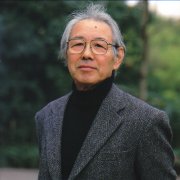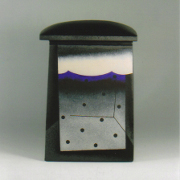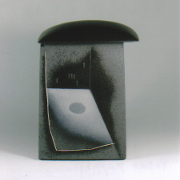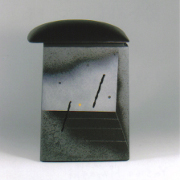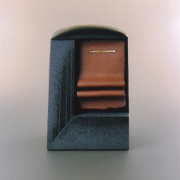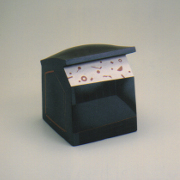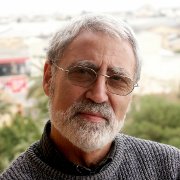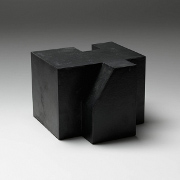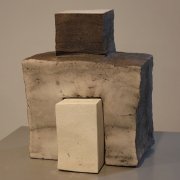Special Exhibition
|
|
||||||||||||||||||
|
Sculptures Yasuo Hayashi |
||||||||||||||||||
|
||||||||||||||||||
|
Three friends, members of the Académie Internationale de la Céramique Genève and among the world’s elite of ceramicists devoted to sculpture, whose works are represented in collections and museums around the globe, have decided to present their work in a three men show at three European cities: Heidelberg, Budapest and Valencia. Yasuo Hayashi (*1928 Kyoto), Enric Mestre (*1936) from Valencia, Sandor Kecskemétí (*1947) from Budapest and it is in the Gallery Marianne Heller at Heidelberg that the triumvirate will first present their works, from there to move on to Budapest and Valencia. Their common interest being the exploration of threedimensional space in sculpture their respective solutions of the basic problems of sculptural art could not be more aesthetically and technically different.
Having abandoned his training as a painter in the 1940ies, Yasuo Hayashi had to take up making domestic pottery for a living, but at the same time founded the avantgardist group Shikokai to discover new means of expression with clay. When flying overland as a pilot in World War II his only clues to orientation in the dark of night were the few spots of light deep underneath. To this day they have inspired his work which tries to recapture something of that strange experience of disorientation in space. His boxlike objects of stoneware he sometimes turns into irritating, bottomless make-belief-spaces with intricate glaze painting and long inlays of porcelain – chunks of night and darkness, which perfectly stage the space they contain while simultaneously deconstructing their very aura of precision and exactness. Examples:
The Spanish artist Enric Mestre’s sculptural objects in comparison seem sober spatial constructions: boxlike, slab built architectural structures of austere colours which seem to be dominated by right angles. But appearances are deceptive: these objects have a poetic charm which saves them from only being rational and cold. The eye of the beholder detects small projections, subtle displacements and slants which, together with the immediate effect of the material, counteract the angularity of the slabs which compose these quiet and well balanced constructions of strict geometrical order and playful deviations. Though these objects are often carefully planned and developed, Eric Mestre with his works insists on intuition – as if obeying a kind of constructive poetics restraining and controlling personal expressions without eliminating them. Examples:
Totally different from his fellow artists’ works are the sculptures by Sandor Kecskemétí whose striking characteristic is their massive material solidity. A block of clay or porcelain is quickly cut with a wire, levelled or marked and thus presented in its material consistency while being shaped into its final form. The maker’s deforming action thus leaves marks of his creative power on forms as fresh and direct as the movement of the artist’s hands. Examples:
|
||||||||||||||||||
opening hours: Tue - Fri 11 a.m. - 1 p.m. & 2 - 6 p.m. |
||||||||||||||||||
|
exhibition site: Galerie Heller Phone: +49 (0) 6221 - 61 90 90 |

